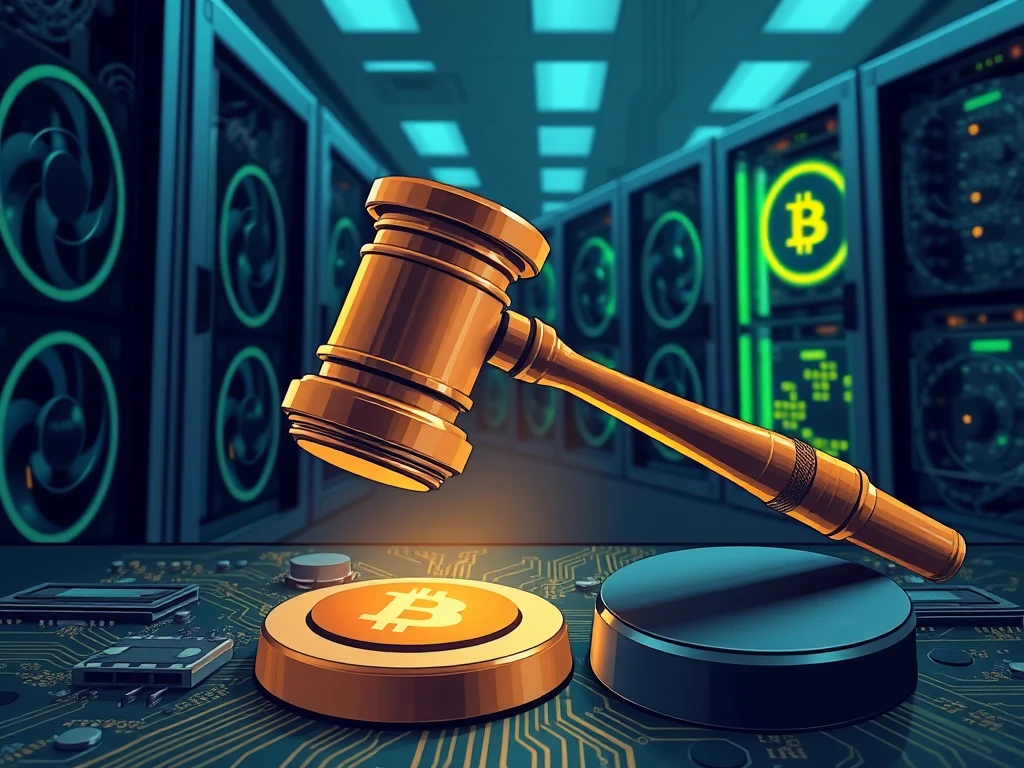Bitcoin Miners Face Legal Threat Over Cryptography Patents

A significant legal challenge has emerged in the world of cryptocurrency. Major Bitcoin miners are now facing lawsuits that could have substantial financial implications and potentially impact the broader Bitcoin mining industry.
The Core of the ECC Lawsuit
The lawsuits target prominent Bitcoin miners, specifically naming Marathon Digital Holdings and Core Scientific. The plaintiff is Malikie Innovations, a company that recently acquired a massive portfolio of patents from communications giant BlackBerry.
At the heart of the dispute are claims that the defendants are infringing upon cryptography patents held by Malikie. These patents allegedly cover aspects of Elliptic Curve Cryptography (ECC), a fundamental cryptographic technique used extensively in the Bitcoin blockchain to secure transactions and manage digital signatures.
Malikie Innovations acquired approximately 32,000 patents from BlackBerry in 2023. The company asserts that among these patents are key innovations related to ECC that were later incorporated into Bitcoin’s design.
What Are Cryptography Patents and Why Do They Matter?
Cryptography patents protect specific methods, algorithms, or systems used for secure communication and data handling. In this case, Malikie claims its patents cover the ECC methods employed by Bitcoin mining operations.
The lawsuit alleges that by engaging in Bitcoin mining, companies like Marathon Digital and Core Scientific are directly utilizing these patented cryptographic techniques without proper licensing.
Potential Outcomes and Expert Insights
Legal experts weigh in on the possible ramifications of this ECC lawsuit:
- Impact on Individual Users: Aaron Brogan, founder of Brogan Law, suggests individual Bitcoin users are unlikely targets, primarily because pursuing them is difficult and they are often not financially viable targets for large lawsuits.
- Why Miners Are Targeted: Brogan notes that large mining firms like Marathon Digital and Core Scientific are attractive targets because they possess significant assets.
- Financial Penalties: If Malikie prevails, they could seek to recover up to six years of lost royalties. This sum is hard to predict but could be substantial, potentially even leading to bankruptcy for the defendant firms.
- Setting Precedent: A win for Malikie could establish a precedent, potentially enabling them to pursue similar cases against other Bitcoin miners in the United States.
- Network Security Risk?: Brogan raises the possibility that aggressive pursuit of many miners could theoretically undermine the security of the Bitcoin network, though he believes Malikie is more likely to seek royalties than destroy the industry.
Niko Demchuk, head of legal at AMLBot, offers a more cautious perspective on the strength of Malikie’s claim:
- He questions the strength of the case if the asserted patents are expired or predate Bitcoin’s ECC implementation.
- He believes that even if active, the patents might only cover specific implementation details, not the core ECC algorithms fundamental to Bitcoin.
- However, he acknowledges that the final outcome depends heavily on the specific patents involved and the court’s interpretation.
Historical Context: Patent Disputes in Crypto
This isn’t the first time intellectual property has become a battleground in the crypto space. Famously, Craig Wright has made numerous attempts to claim ownership over parts of Bitcoin’s technology, including the white paper, leading to various legal challenges and disputes.
While different in nature, these past events highlight the ongoing tension between open-source technology like Bitcoin and traditional intellectual property claims, including cryptography patents.
Conclusion
The lawsuit brought by Malikie Innovations against Bitcoin miners like Marathon Digital and Core Scientific over alleged infringement of cryptography patents represents a significant legal development. While the immediate targets are large Bitcoin mining operations, the case raises questions about the intersection of traditional patent law and decentralized technologies. The outcome of this ECC lawsuit will be closely watched, as it could have implications for the financial stability of mining companies and potentially set precedents for future IP challenges in the cryptocurrency industry.










